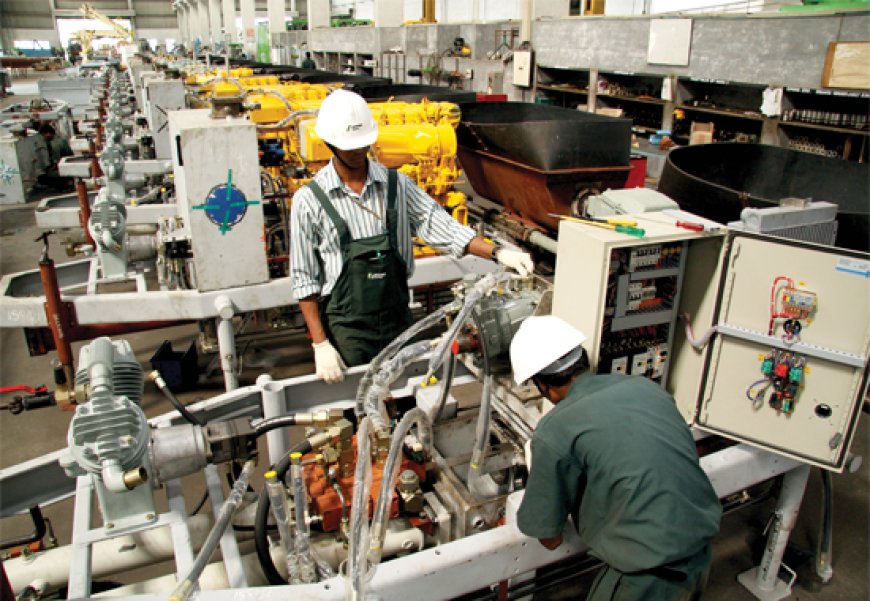We, at Schwing Stetter India are working towards lean manufacturing.
V. G. Sakthikumar, Managing Director, Schwing Stetter India. We have designed our products to comply with industry 4.0 in the top variants / models. Schwing Stetter India has five production facilities located at Irungatukottai, Sriperumbudur, Kancheepuram each dedicated for manufacturing

 V. G. Sakthikumar,
V. G. Sakthikumar,
Managing Director,
Schwing Stetter India.
We have designed our products to comply with industry 4.0 in the top variants / models.
Schwing Stetter India has five production facilities located at Irungatukottai, Sriperumbudur, Kancheepuram each dedicated for manufacturing of specific concreting line of products. The company has already stepped into Industry 4.0 and the process of digitization. “We have developed systems using VR to train our operators and AR is developed and presently under approval stages for implementation,” states V. G. Sakthikumar, Managing Director, Schwing Stetter India. Excerpts from the interview
How do you assess the recent trends in the manufacturing sector, especially in the manufacture of construction and mining equipment?
The recent trend in manufacturing sector is moving towards Industry 4.0, creating a platform for accurate processes and productivity. It has tremendously improved the quality and has cut down the costs. Since the development is towards smarter working pattern, the working environment has become safer and precise.
Market potential is on an upward growth trend at the same time prevailing environment is highly competitive for the construction equipment sector. We think that it is high time to look for efficiency improvement throughout right from lead enquiry stage up to project commissioning and after sales service. Our focus is to reduce cost of the product and lead time reduction in manufacturing without compromising quality requirement.
Could you elaborate on the manufacturing philosophy / production principles of your company?
We, at Schwing Stetter India are working towards lean manufacturing. As a sub activity, line production is on certain areas for runner products, batch production for semi runner products are already taken up and the focus is more towards operational efficiency improvement. We believe in customer satisfaction through prompt service support, on time delivery and zero compromise on quality. We take utmost care to have safest working atmosphere which creates a better environment.
And how these principles to ensure ‘zero defects’ ‘environment-friendliness’ and ‘safety’ in your production processes and supply chain?
Schwing Stetter products are generally made with zero defective components, by way of doing small adjustments wherever applicable within the acceptable range. We give top most priority for safe working practices by providing reliable jigs, fixtures, supporting equipment for manufacturing and safety devices. All processes are controlled through approved process qualifications and their validations, use of specialised tools and gauges to monitor and control mechanism to achieve ‘Zero Defects’. Environment friendliness is taken care through solar panels, waste water treatment plant, ETP, STP, energy efficient HVAC in our processes.
Using embedded sensors and other resources, the possibilities are endless for construction equipment functionality. How have you leveraged the advantages of this on your production systems and products?
We as a construction equipment manufacturer, considering present infrastructure growth in the network domain and have designed our products to comply with industry 4.0 in the top variants / model which are available in our product range. We have implemented mobile controllers in Stetter concrete transit mixers, Stetter self-loading mixers and Schwing concrete pumps which interfaces with various sensors like oil contamination, pressure, level and temperature for capturing process data to cloud through a gateway device for data analysis and this controller also support CAN protocol which indeed can be used to interface with the CAN based engines.
We have PLC and micro controller based control system in the Stetter concrete batching plants that automates entire concrete production process. We also support networking of Stetter concrete batching plants. Our concrete batching plants are located in various locations wherein we provide an app / tool to send data to a centralized server or cloud which benefits our customer to have the productivity and efficiency data in his palm top device. This technology innovation plays a vital role in the reduction of downtime and increased productivity with less human intervention.
In our internal testing of our products for example: test server for Schwing concrete pump, the entire testing parameters are connected to our servers for monitoring of hierarchical stages of testing. The testing system is tamper-proof at all stages and the series of test data are captured at our servers and validated by the system itself and approved only if the set parameters are met by the product tested. For any stage to proceed from the present stage to the subsequent stage, the system has to clear and approve the tested parameters, else the system does not allow the testing process to proceed further. In our internal production line, sensors are used extensively wherever possible to eliminate any unsafe act and thereby prevent any unsafe incidents.
To what extent your company has imbibed digital technologies on manufacturing? And how have you been able to leverage the digital platforms in your manufacturing set up?
We have just stepped into the phase of introducing digitalization of our processes. For example, Q-Weld data system: the welding parameters are being monitored while it is being welded on our products and monitored against the approved Welding Procedure Specification (WPS) / Welding Procedure Qualification Record (WPQR) and reports are generated against a deviation if found. This enables us to track the defective weld and make corrective action plan for continuous process improvement. Efficiency in monitoring these processes increases productivity which is an additional input from this system.
What do you think the major challenges in replacing legacy system with newer technologies? Do you think cost is a deterrent?
Legacy systems can definitely be replaced with newer technologies. We need to do cost benefit analysis for the processes and work it out, we don’t think cost is a deterrent. The challenges would be cost of vehemence of people to adapt to the immediate changes to come out of the present routine practices. Initial cost may be a barrier but it is essential to note that returns are truly visible and encouraging.
The concept of smart manufacturing (Industry 4.0) has gained a lot of attention in recent times. What is your take on this? To what extent you have implemented these trends in your manufacturing set up?
Industry 4.0 is a huge step and cannot be done through a single jump. As stated above, we have just stepped into and are in a transformation phase. Industry 4.0 is more suitable for the process where more data are handled in the manufacturing processes. In the sense that, where more line of robotics or line of automated systems are introduced in the manufacturing process. Secondly, for benchmarking machine safety where critical machines are used in our company eg: FBM, hard facing robots, CNC plasma cutting machine, all special purpose welding machines, etc.
What is the scope of augmented reality (AR) and virtual reality (VR) in the equipment sector?
AR and VR will definitely be useful in the construction equipment sector to ensure assembly simulation and before proto type making to reduce wastage of cost in the New Product Development (NPD). We have developed systems using VR to train our operators for Schwing truck mounted concrete boom pump operation and for other product – Stetter concrete batching plant operation using AR is developed and is presently under approval stages for implementation. These areas are essential for training our internal welders and operators of Schwing Stetter customers who handle our machinery. Similarly, training the welders have been initiated through VR and is under development.
Give us a brief on your manufacturing facilities, investment, and road map?
Schwing Stetter India has five production facilities located at Irungatukottai, Sriperumbudur, Kancheepuram each dedicated for manufacturing for specific concreting line of products – Stetter concrete batching plant, Stetter concrete transit mixer, Schwing concrete pumps, Schwing truck mounted concrete boom pump fabrication facility and Stetter self-loading mixer. Also, we have invested for constructing a new facility at Cheyyar to fabricate, assemble and test our pumps (Schwing truck mounted concrete boom pumps and Schwing stationary pumps) all under a single roof with an area of 53 acres, which will also accommodate XCMG road machinery.
What do you think the major manufacturing trends, and which of these you have implementing or in the processes of implementation?
The major manufacturing trends that are implemented and are being implemented are line production of runner products like DW mixers are implemented. Man Machine Language (MML) for Stetter concrete batching plants CP18, CP18TM, M21Z, M25Z, M30Z are under progress. Industry 4.0 – IoT, cyber physical systems, cognitive computing and cloud computing – we are yet to start working on this for our manufacturing processes but are available for our range of products. Identification on non-core activities as we are continually improving through Kaizen and implementation of Just-In-Time (JIT) manufacturing in all
the areas.
Hits: 119








